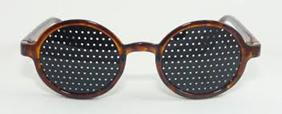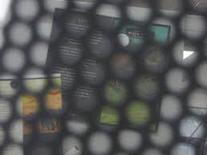I Can't Really See Anything...But It's Very Clear
Pinhole Glasses
Time and again I am asked about pinhole glasses. One reason for this is that I have something of a reputation for working differently with nearsightedness (myopia). I am very much in favor of preventing, reversing, reducing or eliminating nearsightedness. I have the same philosophy as regards farsightedness and astigmatism. The other reason is that there are still people out there singing the praises of things like pinhole glasses to treat these conditions, particularly nearsightedness.
I decided to become an optometrist because of my severe nearsightedness. I was intent on helping people avoid what I had gone through for most of my life at that time. I got my first pair of glasses around the age of eight. My prescription just got stronger and stronger as time went on. It only stopped getting stronger after I stopped letting eye doctors tell me what to do. Around that same time I was evaluated by a behavioral optometrist. I was finally properly diagnosed and I started a vision therapy program - this was early in my first year of optometry school. I simultaneously began a more creative approach to lenses - using myself as my first guinea pig. And yes, I tried out some pinhole glasses around this time.

I admit that, at first blush, pinhole glasses create an impressive change in how clearly one sees. The change in clarity of eyesight is attributable to one simple fact. This fact, as fate would have it, is known as “the pinhole effect.” The pinhole effect is a simple matter of optics - the physics of light. I will not go into the details of the pinhole effect here…that’s why we have Google and Wikipedia. Suffice it to say that looking through a pinhole overrides the front half of the eyeball in order to project the incoming light more precisely on the back of the eye. This can make things noticeably clearer while the pinhole is in place. Pinhole glasses are merely an array of such pinholes, but the effect is the same.
Pinhole glasses have the same effect as squinting. Squinting only works because of the pinhole effect. Many people think that squinting makes things clearer because they are forcing their focusing to work better. The opposite is actually true. We must relax our focusing mechanisms in order to see clearly in the distance. A good deal of nearsightedness is caused by an inability to relax the focusing muscles when looking far away. Squinting and pinhole glasses have no positive effect on how we focus. Our eyelashes and almost-closed eyelids basically create a pinhole effect.
Once you stop squinting or looking through pinhole glasses, the effect is over; there is no carry-over. And you cannot really do anything but sit there if you are wearing pinhole glasses since your overall vision is so compromised. The important thing is that the effect is not sustained in any way once the glasses are removed, no matter how much you use them. This is because pinhole glasses do nothing to alter the way the brain uses the eyes, which is the way that real change in any visual behavior occurs. There is no myopia reduction as a result of wearing pinhole glasses. I’m not aware of any real benefit that results from the use of pinhole glasses. I really wanted them to work when I first encountered them, but it just isn’t so.

The world through pinhole glasses
A few of my colleagues have found pinhole glasses useful. I have yet to figure out exactly what benefit they suppose is gained. I have found no real use for pinhole glasses. Some believe that the simple fact that the person is not wearing their regular lenses means their eyes are more relaxed. I do not find the trade-off of the Swiss-cheese-like disruption of what is seen through the pinholes to be worth the minimal, short-term return.
My advice to you is, if you’re looking for ways to stop nearsightedness, throw away your pinhole glasses and find a behavioral optometrist to work with. If you want to learn more about myopia reduction, I heartily recommend my book, Looking Differently at Nearsightedness and Myopia: The Visual Process and The Myth of 20/20. I wrote this book because, as I learned more about the whole visual process - as opposed to simply seeing clearly - I found myself quite unsatisfied with not only pinhole glasses, but almost all of the books out there supposedly telling people how to "cure" their nearsightedness. You're much better off finding a trained professional who shares your goals. To find a behavioral optometrist near you go to oepf.org.
Call Dr. Gallop at 610-356-7425 for more information. You can speak with the doctor personally.
